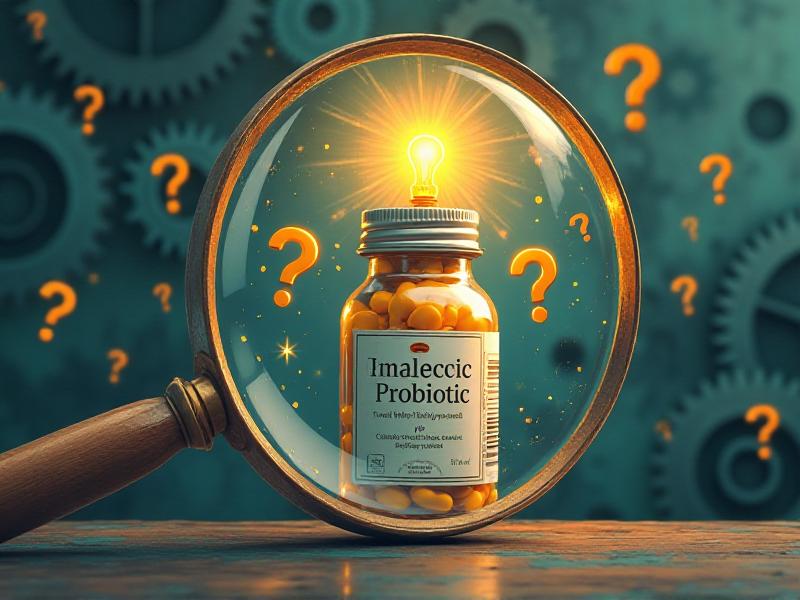From Knowledge to Healing: Implementing Probiotic Insights
The Science Behind Probiotics: Understanding the Basics
Probiotics have become a buzzword in the health and wellness industry, but what exactly are they? At their core, probiotics are live microorganisms, primarily bacteria and yeast, that confer health benefits when consumed in adequate amounts. These beneficial microbes are often referred to as "good" or "friendly" bacteria because they help maintain a balanced gut microbiome, which is crucial for overall health.
The human gut is home to trillions of microorganisms, collectively known as the gut microbiota. This complex ecosystem plays a vital role in digestion, immune function, and even mental health. When the balance of this ecosystem is disrupted—due to factors like poor diet, stress, or antibiotic use—it can lead to a host of health issues, including digestive disorders, weakened immunity, and chronic inflammation.
Probiotics work by replenishing and supporting the beneficial bacteria in the gut, thereby restoring balance. They can be found in various fermented foods like yogurt, kefir, sauerkraut, and kimchi, as well as in dietary supplements. The most common strains of probiotics include Lactobacillus and Bifidobacterium, each with its own unique health benefits.

The Gut-Brain Connection: How Probiotics Influence Mental Health
The gut-brain axis is a bidirectional communication system that links the central nervous system with the enteric nervous system of the gut. This connection means that the health of your gut can significantly impact your mental well-being. Emerging research suggests that probiotics may play a crucial role in managing mental health conditions such as anxiety, depression, and even cognitive decline.
One of the ways probiotics influence mental health is through the production of neurotransmitters. For example, certain strains of Lactobacillus and Bifidobacterium can produce gamma-aminobutyric acid (GABA), a neurotransmitter that has a calming effect on the brain. Low levels of GABA are associated with anxiety and mood disorders, so increasing its production through probiotic supplementation could potentially alleviate these symptoms.
Additionally, probiotics can reduce inflammation in the gut, which is often linked to neuroinflammation and mental health issues. Chronic inflammation can disrupt the blood-brain barrier, allowing harmful substances to enter the brain and contribute to conditions like depression. By maintaining a healthy gut lining and reducing inflammation, probiotics may help protect against these adverse effects.

Probiotics and Immune Health: Strengthening Your Body's Defenses
The immune system is a complex network of cells, tissues, and organs that work together to defend the body against harmful invaders like bacteria, viruses, and toxins. A significant portion of the immune system is located in the gut, making it a critical area for immune health. Probiotics play a vital role in supporting and modulating the immune response, helping to keep you healthy and resilient.
One of the primary ways probiotics support immune health is by enhancing the gut barrier function. The gut lining acts as a physical barrier that prevents harmful substances from entering the bloodstream. Probiotics help maintain the integrity of this barrier by promoting the production of mucus and tight junction proteins, which seal the gaps between intestinal cells. This prevents pathogens and toxins from leaking into the body and triggering an immune response.
Probiotics also interact directly with immune cells, such as macrophages and dendritic cells, to regulate their activity. They can stimulate the production of antibodies and cytokines, which are signaling molecules that coordinate the immune response. By modulating the activity of these immune cells, probiotics can help ensure a balanced and effective immune response, reducing the risk of both infections and autoimmune diseases.

Probiotics in Clinical Practice: From Research to Real-World Applications
While the benefits of probiotics are well-documented in scientific research, translating these findings into real-world clinical applications can be challenging. Healthcare providers must consider factors such as strain specificity, dosage, and individual patient needs when recommending probiotics. Despite these challenges, probiotics are increasingly being integrated into clinical practice for a variety of conditions.
One area where probiotics have shown significant promise is in the management of gastrointestinal disorders. Conditions like irritable bowel syndrome (IBS), inflammatory bowel disease (IBD), and antibiotic-associated diarrhea have all been shown to benefit from probiotic supplementation. For example, certain strains of Bifidobacterium and Lactobacillus have been found to reduce symptoms like bloating, abdominal pain, and irregular bowel movements in IBS patients.
Probiotics are also being explored for their potential in managing metabolic conditions such as obesity and type 2 diabetes. Some studies suggest that probiotics can influence weight loss by modulating gut hormones and reducing inflammation. Similarly, probiotics may improve insulin sensitivity and reduce blood sugar levels in individuals with type 2 diabetes. While more research is needed, these findings highlight the potential of probiotics as a complementary therapy in metabolic health.

Choosing the Right Probiotic: A Guide for Consumers
With the growing popularity of probiotics, the market is flooded with a wide range of products, each claiming to offer unique health benefits. However, not all probiotics are created equal, and choosing the right one can be overwhelming for consumers. Understanding key factors like strain specificity, CFU count, and product quality can help you make an informed decision.
Strain specificity is one of the most important considerations when selecting a probiotic. Different strains of bacteria have different effects on the body, so it's essential to choose a product that contains strains proven to address your specific health concerns. For example, Lactobacillus rhamnosus GG is well-known for its ability to support digestive health, while Bifidobacterium longum may be more effective for immune support.
Another critical factor is the colony-forming unit (CFU) count, which indicates the number of live microorganisms in each dose. While a higher CFU count may seem better, it's not always necessary. The optimal CFU count depends on the specific strain and the condition being treated. Additionally, it's important to choose a product from a reputable brand that undergoes third-party testing to ensure quality and potency.

The Future of Probiotics: Innovations and Emerging Trends
As research into probiotics continues to advance, new innovations and trends are emerging that could revolutionize the way we think about gut health. From personalized probiotics to next-generation delivery systems, the future of probiotics is full of exciting possibilities.
One of the most promising areas of innovation is personalized probiotics. Advances in microbiome sequencing technology now allow scientists to analyze an individual's gut microbiota and identify specific strains of bacteria that may be lacking or imbalanced. This information can be used to create customized probiotic formulations tailored to an individual's unique needs, potentially enhancing the effectiveness of probiotic therapy.
Another emerging trend is the development of next-generation delivery systems that improve the survival and efficacy of probiotics. Traditional probiotic supplements often struggle to survive the harsh conditions of the digestive tract, reducing their effectiveness. New technologies like microencapsulation and biofilm-based delivery systems are being developed to protect probiotics as they travel through the gut, ensuring that more live bacteria reach their target destination.

Probiotics and Lifestyle: Integrating Gut Health into Daily Life
While probiotics offer numerous health benefits, they are most effective when combined with a healthy lifestyle. Diet, exercise, stress management, and sleep all play a crucial role in maintaining a balanced gut microbiome. By making mindful choices in these areas, you can enhance the effectiveness of probiotics and support overall well-being.
Diet is perhaps the most significant factor influencing gut health. A diet rich in fiber, fruits, vegetables, and fermented foods provides the nutrients and prebiotics needed to nourish beneficial gut bacteria. Prebiotics are non-digestible fibers that serve as food for probiotics, helping them thrive and multiply. Incorporating a variety of these foods into your diet can create a favorable environment for probiotics to work their magic.
Exercise and stress management are also essential for gut health. Regular physical activity has been shown to promote a diverse and balanced gut microbiota, while chronic stress can disrupt the gut-brain axis and lead to imbalances. Practices like yoga, meditation, and deep breathing can help manage stress and support a healthy gut. Additionally, prioritizing quality sleep is crucial, as poor sleep has been linked to gut dysbiosis and increased inflammation.

Probiotics for Special Populations: Tailoring Benefits to Unique Needs
While probiotics offer benefits for people of all ages, certain populations may have unique needs that require special consideration. Infants, pregnant women, the elderly, and individuals with chronic health conditions can all benefit from targeted probiotic interventions, but the approach must be tailored to their specific circumstances.
For infants, probiotics can play a crucial role in establishing a healthy gut microbiome, which is essential for immune development and overall health. Breastfed infants naturally receive beneficial bacteria from their mother's milk, but probiotic supplements can be beneficial for formula-fed babies or those born via cesarean section, who may have a less diverse gut microbiota.
Pregnant women can also benefit from probiotics, particularly in reducing the risk of gestational diabetes and preventing infections like bacterial vaginosis. Additionally, probiotics may help alleviate common pregnancy-related digestive issues like constipation and bloating. For the elderly, probiotics can support immune function, improve nutrient absorption, and reduce the risk of infections, which are more common in older adults.

Debunking Myths: Separating Fact from Fiction in Probiotic Science
As with any popular health trend, probiotics have their fair share of myths and misconceptions. While the science behind probiotics is robust, misinformation can lead to confusion and unrealistic expectations. It's essential to separate fact from fiction to make informed decisions about probiotic use.
One common myth is that all probiotics are the same. In reality, different strains of bacteria have different effects on the body, and not all probiotics are effective for every condition. It's important to choose a probiotic that has been clinically studied for the specific health concern you're addressing. Another misconception is that more is always better when it comes to CFU count. While a higher CFU count may be beneficial in some cases, it's not a guarantee of effectiveness, and excessive doses can sometimes lead to side effects like bloating and gas.
Another myth is that probiotics are a cure-all for every health issue. While they offer numerous benefits, probiotics are not a substitute for medical treatment or a healthy lifestyle. They should be used as part of a comprehensive approach to health that includes a balanced diet, regular exercise, and stress management. By understanding the limitations and potential of probiotics, you can make more informed choices and set realistic expectations.

Ethical Considerations: The Role of Probiotics in Sustainable Health
As the demand for probiotics continues to grow, it's important to consider the ethical implications of their production and use. From environmental impact to equitable access, there are several factors to consider when evaluating the role of probiotics in sustainable health.
One ethical concern is the environmental impact of probiotic production. The cultivation of probiotic strains often requires significant resources, including energy, water, and raw materials. Additionally, the packaging and distribution of probiotic products can contribute to plastic waste and carbon emissions. To address these issues, some companies are exploring more sustainable production methods, such as using renewable energy sources and biodegradable packaging.
Another consideration is equitable access to probiotics. While probiotics are widely available in many parts of the world, they can be expensive and inaccessible to low-income populations. This raises questions about the fairness of promoting probiotics as a health solution when not everyone can afford them. Efforts to make probiotics more affordable and accessible, such as through community health programs or subsidies, can help address this disparity.









